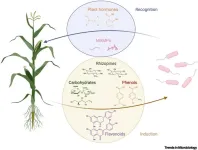(Press-News.org) How are environmental changes, loss of biodiversity, and the spread of pathogens connected? The answer is a puzzle. Scientists from Charité – Universitätsmedizin Berlin in cooperation with the Leibniz Institute for Zoo and Wildlife Research (Leibniz-IZW) have now described one piece of that puzzle in the journal “eLife”, showing that the destruction of tropical rainforests harms the diversity of mosquito species. At the same time, more resilient species of mosquitoes become more prevalent – which also means the viruses they carry are more abundant. If there are many individuals of a given species, those viruses can spread quickly.
For their study, researchers from Charité teamed up with the Leibniz Institute for Zoo and Wildlife Research (Leibniz-IZW) to investigate how clearing rainforests to make way for coffee or cacao plantations or human settlements affects the prevalence and diversity of mosquitoes and the viruses they carry. The study, which brings together the fields of virology and biodiversity research, was led by Prof. Sandra Junglen, head of the Ecology and Evolution of Arboviruses research group at the Institute of Virology at Charité.
For their research work, the team first caught mosquitoes around Taï National Park in the West African country of Côte d’Ivoire. There is a broad range of land uses there, from pristine rainforest to secondary forest, cacao and coffee plantations, and villages. “We identified the species of mosquitoes we had caught and tested them for viral infections,” explains Kyra Hermanns of the Institute of Virology at Charité, the first author of the study. “Then we looked at how the composition of mosquito species differs across the different land use types, where certain viruses are present, and how prevalent they are.”
Resilient mosquito species prevail over others
There are many different viruses in a healthy ecosystem such as a pristine rainforest. The main reason is that there is a broad range of animal species living there that can carry the virus, acting as hosts. This is because viruses are always tied to their hosts.
If there is a change in the ecosystem, it affects the viruses as well, Junglen explains: “We discovered 49 virus species, with the greatest diversity of hosts and viruses observed in untouched or minimally disturbed habitats.” Most of the 49 different virus species were relatively rare in the areas studied. However, nine of them were commonly found in multiple habitats, with the prevalence of five virus species increasing in habitats that had been disturbed and reaching the highest figures in human settlements.
“This means that the clearing of tropical rainforests causes a decrease in the diversity of mosquito species, which changes the composition of host types. Some resilient mosquito species have multiplied very successfully in the cleared areas, bringing their viruses with them,” Junglen and Leibniz-IZW scientist Prof. Stephanie Kramer-Schadt, who conducted the association analyses of the mosquitos with viruses and habitats, explain. The composition of a given community of species thus has a direct effect on the prevalence of viruses: “If one host species is very abundant, it is easier for viruses to spread,” Junglen adds. “All of the viruses we found to be more common were demonstrated to be present in a certain mosquito species. The viruses belong to different families and have different properties. That means we were able to show for the first time that the spread of the viruses is attributable not to a close genetic relationship, but to the characteristics of their hosts – especially those mosquito species that adapt well to changing environmental conditions in habitats that have been disturbed.”
New insight into the dynamics of infectious disease
The viruses the researchers found only infect mosquitoes and, as things currently stand, cannot be transmitted to humans. Still, they are a valuable model for understanding how changes in the diversity of a community of species affect the presence and prevalence of viruses. “Our study makes clear just how important biodiversity is, and that decreasing biodiversity makes it easier for certain viruses to thrive because it causes their hosts to become more abundant,” Junglen notes.
“Previously, these kinds of processes were studied almost exclusively using individual pathogens and individual hosts. Now we have a more complete picture that we can use for further research,” she explains. As their next step, the researchers plan to study additional habitats in other countries, with one goal being to pinpoint the exact factors that affect the diversity of mosquito species under land-use change, and the characteristics that viruses need to have in order to spread with their hosts.
END
Decreasing biodiversity may promote spread of viruses
Study on the effects of rainforest clearing on mosquitoes and the viruses they carry
2023-09-26
ELSE PRESS RELEASES FROM THIS DATE:
Effect of combined alcohol and e-cigarette use on blood brain barrier under study at Lewis Katz School of Medicine at Temple University thanks to new NIH grant
2023-09-26
With a variety of flavors and widespread perceptions of safety, e-cigarettes appeal to an array of users and especially to adolescents. E-cigarette use, however, is linked to increased alcohol consumption, as well as the use of other substances and drugs. The health effects of such combinations remain almost entirely unknown.
Now, with new funding from the National Institute on Alcohol Abuse and Alcoholism (NIAAA) of the National Institutes of Health (NIH), researchers at the Lewis Katz School of Medicine at Temple University hope ...
Suicide risks of health care workers in the US
2023-09-26
About The Study: From a nationally representative cohort of approximately 1.84 million employed adults observed from 2008 through 2019, relative to non–health care workers, registered nurses, health technicians, and health care support workers in the U.S. were at increased risk of suicide. New programmatic efforts are needed to protect the mental health of these U.S. health care workers.
Authors: Mark Olfson, M.D., M.P.H., of Columbia University in New York, is the corresponding author.
To access the embargoed study: Visit our For ...
Premorbid sociodemographic status and multiple sclerosis outcomes with universal health care
2023-09-26
About The Study: In this study of working-age adults with multiple sclerosis (MS), premorbid income, education, and marital status correlated with disability and symptom severity in relapse onset and progressive-onset MS, independent of treatment. These findings suggest that socioeconomic status may reflect both structural and individual determinants of health in MS.
Authors: Anna He, M.B.B.S., of the Karolinska Institute in Stockholm, Sweden is the corresponding author.
To access the embargoed study: Visit our ...
Alcohol use and sustained virologic response to hepatitis C virus direct-acting antiviral therapy
2023-09-26
About The Study: In this study of 69,000 adults with hepatitis C virus (HCV) infection, there was no difference in sustained virologic response across alcohol use categories, even for patients with high-risk consumption or alcohol use disorder, after adjusting for potential confounding variables. These findings suggest that restricting access to direct-acting antiviral therapy on the basis of alcohol use creates an unnecessary barrier for patients and challenges HCV elimination goals.
Authors: Emily J. Cartwright, M.D., of the Emory University School of Medicine in Atlanta, ...
Earthworms contribute to 6.5% of global grain production, according to new CSU research
2023-09-26
Earthworms are important drivers of global food production, contributing to approximately 6.5% of grain yield and 2.3% of legumes produced worldwide each year, according to new work published by Colorado State University scientists in the journal Nature Communications.
These new estimates from a trio of CSU researchers mean earthworms may account for as much as 140 million metric tons of food produced annually — roughly comparative to the amount of cereal grains (rice, wheat, rye, oats, barley, maize and millet) ...
Invertebrate decline reduces natural pest control and decomposition of organic matter
2023-09-26
Leipzig. The decline in invertebrates also affects the functioning of ecosystems, including two critical ecosystem services: aboveground pest control and belowground decomposition of organic material, according to a new study published in Current Biology and led by researchers at the German Centre for Integrative Biodiversity Research (iDiv) and Leipzig University. The study provides evidence that loss of invertebrates leads to a reduction in important ecosystem services and to the decoupling of ecosystem processes, making immediate protection measures necessary.
Invertebrates, such as insects and also ...
Genetically engineering associations between plants and nitrogen-fixing microbes could lessen dependence on synthetic fertilizer
2023-09-26
Nitrogen is an essential nutrient for plant growth, but the overuse of synthetic nitrogen fertilizers in agriculture is not sustainable. In a review article publishing in the journal Trends in Microbiology on September 26, a team of bacteriologists and plant scientists discuss the possibility of using genetic engineering to facilitate mutualistic relationships between plants and nitrogen-fixing microbes called “diazotrophs.” These engineered associations would help crops acquire nitrogen from the air by mimicking the mutualisms between legumes and nitrogen-fixing bacteria.
“Engineering associative diazotrophs to provide nitrogen ...
Impact of parental relatedness on type 2 diabetes and other common diseases uncovered
2023-09-26
A new study finds that consanguinity – unions between close relatives - may increase the risk of common diseases such as type 2 diabetes and post-traumatic stress disorder (PTSD).
Researchers from the Wellcome Sanger Institute and their collaborators at Queen Mary University of London analysed the genomic data of diverse groups to investigate the relationship between autozygosity - a measure of genetic relatedness between an individual’s parents - and the prevalence of common diseases, with a novel method that reduces confounding due to sociocultural factors. They focused ...
Redefining global health security: A novel framework sheds light on equity and decolonial approaches
2023-09-26
Redefining Global Health Security: A Novel Framework Sheds Light on Equity and Decolonial Approaches
Kuala Lumpur, Malaysia and London, UK – 25 September 2023
In the wake of the COVID-19 pandemic, a new policy paper titled "Global Health Security and the Health-Security Nexus: Principles, Politics and Praxis" in the journal BMJ Global Health, warns of dangers and potential pitfalls associated with the increased attention paid to ‘global health security’ and the growing interaction between public health and security actors.
According to the authors, the prevailing ...
Inbreeding can be beneficial in the long run
2023-09-26
"Of all the subspecies of reindeer found in the high north, the Svalbard reindeer has the most inbreeding and the lowest genetic diversity," says Nicolas Dussex, a postdoc at Norwegian University of Science and Technology´s (NTNU) Department of Natural History.
It was only 7000-8000 years ago that the first reindeer migrated to Svalbard, most likely from Russia via Novaya Zemlya and the islands of Franz Josef Land. Perhaps there were no more than a few animals that established themselves on the arctic ...
LAST 30 PRESS RELEASES:
White House autism briefing linked to swift shifts in prescribing patterns, study finds
Specialist palliative care can save the NHS up to £8,000 per person and improves quality of life
New research warns charities against ‘AI shortcut’ to empathy
Cannabis compounds show promise in fighting fatty liver disease
Study in mice reveals the brain circuits behind why we help others
Online forum to explore how organic carbon amendments can improve soil health while storing carbon
Turning agricultural plastic waste into valuable chemicals with biochar catalysts
Hidden viral networks in soil microplastics may shape the future of sustainable agriculture
Americans don’t just fear driverless cars will crash — they fear mass job losses
Mayo Clinic researchers find combination therapy reduces effects of ‘zombie cells’ in diabetic kidney disease
Preventing breast cancer resistance to CDK4/6 inhibitors using genomic findings
Carbon nanotube fiber ‘textile’ heaters could help industry electrify high-temperature gas heating
Improving your biological age gap is associated with better brain health
Learning makes brain cells work together, not apart
Engineers improve infrared devices using century-old materials
Physicists mathematically create the first ‘ideal glass’
Microbe exposure may not protect against developing allergic disease
Forest damage in Europe to rise by around 20% by 2100 even if warming is limited to 2°C
Rapid population growth helped koala’s recovery from severe genetic bottleneck
CAR-expressing astrocytes target and clear amyloid-β in mouse model of Alzheimer’s disease
Unique Rubisco subunit boosts carbon assimilation in land plants
Climate change will drive increasing forest disturbances across Europe throughout the next century
Enhanced brain cells clear away dementia-related proteins
This odd little plant could help turbocharge crop yields
Flipped chromosomal segments drive natural selection
Whole-genome study of koalas transforms how we understand genetic risk in endangered species
Worcester Polytechnic Institute identifies new tool for predicting Alzheimer’s disease
HSS studies highlight advantages of osseointegration for people with an amputation
Buck Institute launches Healthspan Horizons to turn long-term health data into Actionable healthspan insights
University of Ottawa Heart Institute, the University of Ottawa and McGill University launch ARCHIMEDES to advance health research in Canada
[Press-News.org] Decreasing biodiversity may promote spread of virusesStudy on the effects of rainforest clearing on mosquitoes and the viruses they carry






